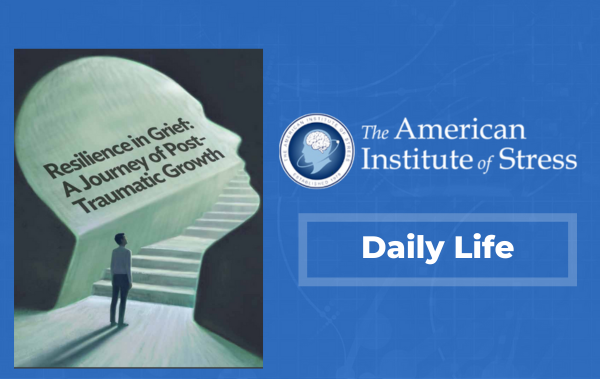It’s Monday morning. You overslept, your kids were late for school, and your boss gave you a hard time because you came in 30 minutes after your shift began. At lunchtime, you head to a nearby deli, and it’s incredibly busy. After waiting in line for 15 minutes and placing your order, you realize that you left your wallet at the office. You head back to work hungry, sit down at your desk, your mind starts racing a million miles a second, and you can’t think clearly.
The chaotic start to your week has made you incredibly stressed, and the anxiety is palpable. At this point, you’re simply not able to produce at your full potential. You try to clear your mind, but you’re struggling to calm yourself down — which exacerbates the issue.
At some point or another, we’ve all found ourselves in these kinds of stressful situations. If you’re like most people, you probably haven’t given much thought to stress other than the fact that it’s an inevitable part of life. What you might not know is that stress has a profound impact on the body, and those who underestimate or ignore stress do so at their own risk.
HOW DOES STRESS AFFECT THE BODY?
Believe it or not, stress has an impact on every system in the body:
- Cardiovascular system — The heartbeat accelerates and adrenaline, cortisol, and noradrenaline course through the body; over time, chronic stress can lead to heart attacks, hypertension, and strokes.
- Nervous system — Stress causes the nervous system to speed up heartbeats, make people breathe faster, and increase glucose levels in the body for more energy.
- Endocrine system — Through the pituitary gland, the hypothalamus tells the adrenal glands to produce more cortisol; over a long enough timeline, repeated stress affects the body, which can lead to chronic fatigue, depression, and immune disorders as communication between the hypothalamus, pituitary gland, and adrenal gland deteriorates.
- Musculoskeletal system — Muscles tense up as your fight or flight response is triggered, which can lead to headaches and migraines.
- Respiratory system — Breathing intensifies, which can cause shortness of breath or impact preexisting conditions, like asthma and COPD.
- Gastrointestinal system — Brain-gut communication is impacted, which can lead to vomiting, bowel discomfort, and unhealthy diets; stressed individuals might smoke and drink to take the edge off.
- Reproductive system — Sexual desires diminish; men can have a harder time producing sperm; women’s menstrual cycles can get disrupted and they may have a harder time trying to conceive.
Now that you have a better idea about how stress affects the body, let’s take a deeper look at some of the physical effects of stress.
WHAT ARE THE PHYSICAL SYMPTOMS OF STRESS?
For many people, stress is simply part of what it means to be human. But, as you can see, stress can actually be the cause of a number of serious health issues that some people might think are unexplained medical conditions.
If you’ve been dealing with a lot of stress lately, here are some of the ways that stress might manifest in your day-to-day life.
1. Digestive system problems
Many people don’t associate stress with digestive issues. But reality paints a different picture. When you’re continuously anxious and stressed, you can experience a number of different digestive issues due to the way stress impacts the brain-gut connection. On one end of the spectrum, you might experience butterflies in the stomach. When you are continuously stressed, you might have cramps, diarrhea, vomiting, constipation, and ulcers. On top of that, you might also lose your appetite — or eat considerably more than you normally would.
2. Muscle tension
When the fight or flight response is triggered, your muscles tense up so that you are more prepared to meet whatever resistance is headed your way. If you’re the kind of person who is always stressed out, your muscles will be tight on a regular basis. Over time, this can translate into more headaches and pain in the lower back and upper extremities.
3. Getting sick a lot
Stress has also been linked to a number of sicknesses. For example, those who suffer from chronic stress might experience low-grade fevers that persist. What’s more, studies have also found that people who are stressed are more likely to catch a common cold.
4. Depression
When people suffer from chronic stress that is not resolved, the condition can spiral out of control, resulting in depression. This, in turn, can lead to a number of other health problems — like a bad appetite, poor sleeping habits, and unpredictable mood swings.
5. Panic attacks
When you’re under a great deal of stress, you begin to breathe faster and faster. Depending on how bad it gets, you can begin hyperventilating and experience chest pains — that could signal the onset of panic attacks, something that nearly 5 percent of Americans experience. While panic attacks can’t kill you, they can seem that way when you’re in the middle of one.
6. Other systems
Stress can cause a slew of other symptoms, too. For example, highly stressed individuals are likely to have a lower sex drive. And even if they don’t, they’re less likely to have sex because they’re not in a great mood, which means their partners aren’t, either. (Interestingly, research suggests that sex can actually be a good way to manage stress and that individuals with lower stress levels are more likely to have sex.)
Additionally, chronically stressed individuals may be more likely to develop obesity due to increased glucocorticoid exposure. People who are stressed out often fall victim to “stress eating,” which causes them to eat way more than they should. Over a long enough period of time, this can lead to considerable weight gain, obesity, diabetes, and other conditions.
The good news is that those who are suffering from stress aren’t without hope. Stress affects the body in so many ways, but by making a few healthy changes in your life, you can go a long way toward alleviating stress, maintaining a happier mood, and living a great life. In the next section, we’ll learn how to do that.
HOW TO DEAL WITH STRESS
If you’ve been dealing with a lot of stress lately, you should strongly consider taking proactive action to alleviate it so that you can live your best life. Some easy ways to do this include improving your diet, getting more exercise, getting a better night’s sleep, and taking up a new hobby.
In most cases, you should also think about a two-pronged approach to stress management that includes both your medical doctor, who can address any acute or life-affecting physical symptoms and a therapist, who can work with you to relieve the cause of your symptoms and learn how to handle stress and anxiety in a healthier way.
© Copyright 2021 GoodTherapy.org. All rights reserved. Permission to publish granted by GoodTherapy






